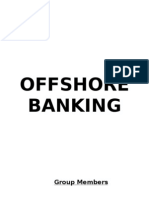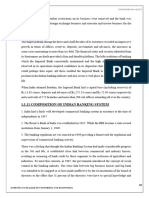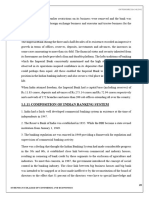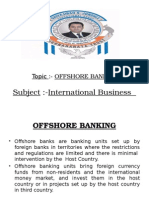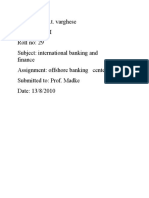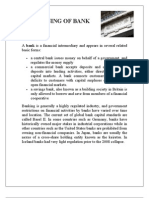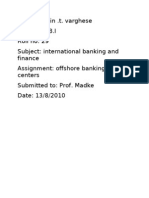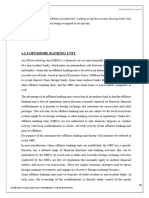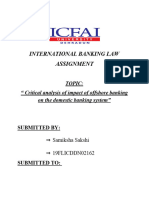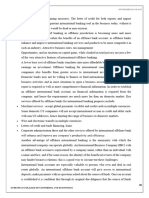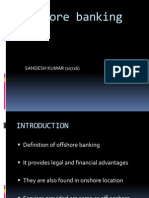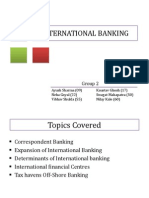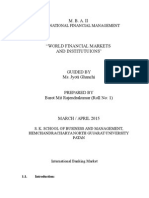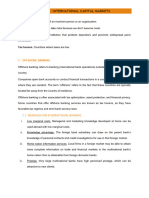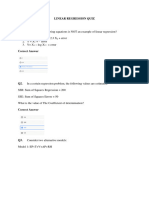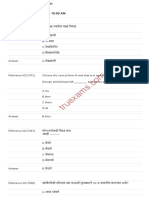Research Design: Objectives
Uploaded by
YaDu NaIrResearch Design: Objectives
Uploaded by
YaDu NaIrOFFSHORE BANKING
RESEARCH DESIGN
OBJECTIVES
The main objective to select the topic is to know about
OFFSHORE BANKING which is widely used in today’s modern
world. Many of the large financial organizations as well as
institutions who operate worldwide often hold this account for
better management functions. Highlights:
Merits and demerits
Regulation of offshore banks
Procedures and maintenance
Offshore banking risks etc.
The other purpose to choose this topic is to highlight many aspects
which can help to know the offshore banking, which will certainly
prove beneficial.
HYPOTHESIS
Offshore banking is progressing at a faster rate. There are so
many benefits if a person maintains his offshore account. Also, there
are many standardized rules and regulations for the offshore banks.
This enables them to operate in a customized manner and provide
quality services to its clients worldwide. In future, it might become
compulsory for all the big organizations to have an offshore
account. This is because of globalization. Globalization of an
economy permits its citizens to operate internationally and earn
TYBCOM (BANKING & INSURANCE ) 1
OFFSHORE BANKING
maximum gains. In
such a OFFSHORE BANKING situation it is
advantageous to have satisfactory knowledge about OFFSHORE
BANKING. It is good and helpful to know about different topics
related to banking sector. This will surely be knowledgeable and
very informative in future.
RESEARCH METHODOLOGY
Research will particularly be on the basis of the secondary
data i.e. internet, books, magazines, articles in the newspapers etc.
A visit to the ICICI BANK is done which facilitates OFFSHORE
BANKING which forms a
part of the survey so that
more information
about the topic can gathered.
TYBCOM (BANKING & INSURANCE ) 2
OFFSHORE BANKING
INTRODUCTION
Rupert Murdoch and Offshore: one of the wealthiest US
citizens uses offshore to reduce tax.
George Soros is known as the wealthiest speculator of all time. His
trading all took place in the Netherlands Antilles, where his
earnings compounded tax free. If you think he has this advantage
only because of his wealth read on.
Here is a list of Trend Followers with operations offshore:
John W. Henry Global Strategies Ltd.
Sjo Global Fund Ltd.
Eckhardt Futures
Mark J. Walsh Global
Chesapeake Fund Ltd.
OFFSHORE BANK
An offshore bank is a bank located outside the country of
residence of the depositor, typically in a low tax jurisdiction (or tax
haven) that provides financial and legal advantages. These
advantages typically include:
Greater privacy
TYBCOM (BANKING & INSURANCE ) 3
OFFSHORE BANKING
Low or no taxation (i.e. Tax havens)
Easy access to deposits (at least in terms of regulation)
Protection against local political or financial instability
While the term originates from the Channel Islands being
"offshore" from the United Kingdom, and most offshore banks are
located in island nations to this day, the term is used figuratively to
refer to such banks regardless of location, including Swiss banks
and those of other landlocked nations such as Luxembourg and
Andorra.
Offshore banking has often been associated with the
underground economy and organized crime, via tax evasion and
money laundering.
In other words, offshore banking is just the practice of
banking in another country with “tax haven” jurisdictions
TYBCOM (BANKING & INSURANCE ) 4
OFFSHORE BANKING
characterized by low or zero taxation on interest, dividends,
royalties and foreign derived income as well as strict banking
secrecy laws.
Offshore banking denotes carrying on banking activity which
is insulated from the monetary regulations of the host country. Very
often, such banking centers are set up deliberately to attract
international banking business of dealing in non-resident foreign
currency denominated assets and liabilities by exempting, reducing
or eliminating restrictions upon banking operations as well a
lowering tax and/or other levies.
TAX HAVENS
The term "tax haven" means a location where particular
taxes are levied at a low rate, or not at all.
At times, Individuals and organizations can move themselves to
areas with lower tax rates. This creates a situation of tax
competition between governments. Different tax jurisdictions tend
to be havens for different kinds of taxes, and for different kinds of
people and organizations.
The former economic adviser to Jersey defines a tax haven
as such:
"What ... identifies an area as a tax haven is the existence of
a composite tax structure established deliberately to take advantage
TYBCOM (BANKING & INSURANCE ) 5
OFFSHORE BANKING
of, and exploit, a worldwide demand for opportunities to engage in
tax avoidance."
This is a pretty good definition, however, some other have
gone further to say that any country that modifies its tax laws to
attract foreign capital could be considered as tax haven.
Switzerland created what is perhaps the first popular
modern tax haven in the early part of the twentieth century. Swiss
banks quickly became a banking haven for citizens of Russia,
Germany and parts of South America avoiding social, political, or
economic problems in their home countries.
OFFSHORE BANK ACCOUNT
Any bank account opened outside of one's native country can
be considered an offshore bank account. Offshore bank account can
be used for savings, or as the main means of banking. It may be
opened by any individual or business in most countries, to have
major benefits in terms of asset protection and tax relief.
Service and benefits offered by local banks and offshore
banks are quite similar: offshore banking may be used as savings
account, or as the main means of banking, making investments,
purchasing insurance and loans.
Difference lies very much in the taxation area. Some offshore
banks require a substantial initial deposit or other restrictions but
the benefits of a lower tax obligation or higher interest rate usually
overweigh this.
TYBCOM (BANKING & INSURANCE ) 6
OFFSHORE BANKING
Now, many people consider opening offshore bank account for
absolutely legitimate financial reasons, - For Example: to move
finances in a jurisdiction more stable economically or politically.
Regular onshore banking is subject to the tax rules, foreign
exchange rules and charges of the country the account is located in.
These rules are also subject to foreign exchange regulations, and are
not covered by the offshore banking confidentiality and asset
protection legislation. On the other hand, offshore banking is tax
free, all account information is confidential and there are no foreign
exchange regulations.
OFFSHORE BANKING IN THE INDIAN CONTEXT
India has made a cautious beginning in offshore banking by
permitting for the first time Offshore Banking Units (OBUs) to be
set up in Special Economic Zones (SEZs). The SEZs have been set
up with a view to providing an internationally competitive and
hassle free environment for export production.
SEZs will be specially delineated duty free enclave and
deemed to be a foreign territory for the purpose of trade operations
and duties / tariffs so as to usher in export-led growth of the
economy. The OBUs virtually would be foreign branches of Indian
banks located in India. These OBUs, inter alia, would be exempt
from reserve requirements and provide access to SEZ units and
SEZ developers to international finances at international rates.
TYBCOM (BANKING & INSURANCE ) 7
OFFSHORE BANKING
The Reserve Bank of India (RBI) has permitted banks
operating in India, whether Indian, public/private sector or foreign,
to set up OBUs in the SEZs. The OBUs would carry out essentially
wholesale banking operations. The OBUs will be set up as branches
of the banks and therefore no separate assigned capital will be
required. All prudential norms applicable to overseas branches of
Indian Banks would apply to OBUs. Thus, the necessary risk
management practices that are in vogue internationally would have
to be adopted by the OBUs. The OBUs will be regulated and
supervised by RBI. They will be required to scrupulously follow
“Know Your Customer” and other anti- Money laundering
directives of RBI from time to time.
FEATURES OF OFFSHORE BANKING IN INDIA:
• They will be permitted to be set up in Special Economic Zones.
• These banks will be virtually (almost) foreign branches of the
banks but located in India.
• The Overseas Banking Units (OBUs) would be exempted from
CRR, SLR etc.
• The OBUs would operate and maintain balance sheet only in
foreign currency and would not be allowed to deal in Indian Rupees
except for having a special Rupee account to meet their day to day
expenses. These branches will not be allowed to participate in
domestic call and money market etc.
TYBCOM (BANKING & INSURANCE ) 8
OFFSHORE BANKING
• These accounts can be opened by Non-Resident Individuals,
Corporates, Trusts or Offshore companies.
FINANCIAL SERVICES BY OFFSHORE BANKING
IN INDIA
Offshore banks in India offer lot of financial services:
• Acceptance of Multi-Currency Deposits
• Multi-Currency borrowing option
• Loans against deposits in foreign currency
• Derivatives products
• Issuance of L/C, Bank Guarantee, Bill Discounting
and collection & negotiation of trade bills
• Long term finance and short term finance (working
capital) in all countries
• External Commercial Borrowings (ECB) etc.
TYBCOM (BANKING & INSURANCE ) 9
OFFSHORE BANKING
STATISTICS CONCERNING OFFSHORE
BANKING
Offshore banking is an important part of the international
financial system. Experts believe that as much as half the world's
capital flows through offshore centers.
Tax havens have 1.2% of the world's population and hold
26% of the world's wealth, including 31% of the net profits of
United States multinationals.
According to Merrill Lynch and Gemini Consulting's “World
Wealth Report” for 2000, one third of the wealth of the world's
“HIGH NET-WORTH INDIVIDUALS”—nearly $6 trillion out of
$17.5 trillion—may now be held offshore. Some $3 trillion is in
deposits in tax haven banks and the rest is in securities held by
international business companies (IBCs) and trusts.
The IMF has said that between $600 billion and $1.5 trillion
of illicit money is laundered annually, equal to 2% to 5% of global
economic output.
Today, offshore is where most of the world's drug money is
allegedly laundered, estimated at up to $500 billion a year, more
than the total income of the world's poorest 20%. Add the proceeds
of tax evasion and the figure skyrockets to $1 trillion. Another few
hundred billion come from fraud and corruption.
"These offshore centers awash in money are the hub of a
colossal, underground network of crime, fraud, and corruption"
commented Lucy Komisar quoting these statistics.
TYBCOM (BANKING & INSURANCE ) 10
OFFSHORE BANKING
Among offshore banks, Swiss banks hold an estimated 35% of
the world's private and institutional funds (or 3 trillion Swiss
francs), and the Cayman Islands (1.9 trillion US dollars in deposits)
are the fifth largest banking centre globally in terms of deposits.
REGULATION OF OFFSHORE BANKS
TERRORIST FINANCE TRACKING PROGRAM
TYBCOM (BANKING & INSURANCE ) 11
OFFSHORE BANKING
A series of articles published on June 23, 2006, by The New
York Times, The Wall Street Journal and The Los Angeles Times
revealed that the United States government, specifically the
Treasury Department and the CIA, had a program to access the
SWIFT transaction database after the September 11th attacks
rendering offshore banking for privacy was severely compromised.
They argue that offshore banking offers a competitive threat
to the banking and taxation systems in developed countries.
International banks may also choose to set up branches or offices at
centers abroad including offshore centers with a view to avoid
conformity to stringent domestic monetary policy regulations. The
basic characteristic of offshore banking is its segregation from the
banking system of the host country. In sense, the banking centers
remain offshore and uncontrolled. Several of the US international
banks set up branches at an offshore center such as Bahamas to get
away from the restriction of the US federal government on domestic
banking in USA
In the 21st century, regulation of offshore banking is allegedly
improving, although critics maintain it remains largely insufficient.
The quality of the regulation is monitored by supra-national bodies
such as the International Monetary Fund (IMF). Banks are
generally required to maintain capital adequacy in accordance with
international standards. They must report at least quarterly to the
regulator on the current state of the business.
Since the late 1990s, especially following September 11, 2001,
there have been a number of initiatives to increase the transparency
TYBCOM (BANKING & INSURANCE ) 12
OFFSHORE BANKING
of offshore banking, although critics such as the Association for the
Taxation of Financial Transactions for the Aid of Citizens (ATTAC)
non-governmental organization (NGO) maintain that they have
been insufficient.
A few examples of these are:
The tightening of anti-money laundering regulations in many
countries including most popular offshore banking locations
means that bankers are required, by good faith, to report
suspicion of money laundering to the local police authority,
regardless of banking secrecy rules. There is more
international co-operation between police authorities.
In the US the Internal Revenue Service (IRS) introduced
Qualifying Intermediary requirements, which mean that the
names of the recipients of US-source investment income are
passed to the IRS.
Following 9/11 the US introduced the USA PATRIOT Act,
which authorises the US authorities to seize the assets of a
bank, where it is believed that the bank holds assets for a
suspected criminal. Similar measures have been introduced in
some other countries.
The European Union has introduced sharing of information
between certain jurisdictions, and enforced this in respect of
certain controlled centres, such as the UK Offshore Islands, so
that tax information is able to be shared in respect of interest.
TYBCOM (BANKING & INSURANCE ) 13
OFFSHORE BANKING
Banks are generally required to maintain capital adequacy in
accordance with international standards. They must report at
least quarterly to the regulator on the current state of the
business.
BANKING SERVICES
It is possible to obtain the full spectrum of financial services
from offshore banks, including:
Deposit taking
Credit
Wire- and electronic funds transfers
Foreign exchange
Letters of credit and trade finance
Investment management and investment custody
Fund management
Trustee services
Corporate administration
USES OF OFFSHORE COMPANIES
Investment Holding
Trading
TYBCOM (BANKING & INSURANCE ) 14
OFFSHORE BANKING
Property Investment
Financing
Patent, Royalty and Copyright Holding
Entertainment, Consultancy and Professional Services
Ship Management and Yacht Owning
International Trade - Letters of credit, documentary
collections, Cross-border guarantees and global banking
services at locations around the world.
Risk Management: Foreign exchange, Interest rate,
Equity and Energy Price Risk Management Tools.
Financing.
Payment, receivables and payroll solutions.
Selling Solutions: Point of sale, E-commerce and
Merchant Programmes.
Speciality solutions, such as dealer, shareowner and fund
services.
Expertise in matters such as energy, aviation, shipping or real
estate.
CREDIT CARD AND DEBIT CARD SERVICES
Most banks offer a comprehensive range of credit and debit
card services for either personal or corporate accounts. In many
cases, the currency of the card is dependent upon the country in
which the bank operates. Many banks have introduced US Dollar
cards to cater for the international market.
TYBCOM (BANKING & INSURANCE ) 15
OFFSHORE BANKING
CLIENTS
1. INDIVIDUAL CLIENTS
The majority of people who open an offshore bank account
fall into one of the three following general categories: -
1) HIGH NET WORTH INDIVIDUALS - These are people
with a disposable income in excess of one million US dollars.
2) EXPATRIATES - These are people who are located overseas
away from their home country either on an employment assignment
or in retirement.
3) BUSINESS OWNERS - Generally these are individuals who
own companies whose shares are owned by family members or a
close working partnership.
According to statistics the majority of individual offshore
banking clients come from Europe, Australia and North America,
but more recently larger numbers of Eastern European, African,
Indian and Asian individuals have found that offshore banking
structures suit their own personal requirements.
TYBCOM (BANKING & INSURANCE ) 16
OFFSHORE BANKING
The ‘type’ of person who falls into the above three categories
range from those with inherited wealth to those who have earned it
by themselves and they all utilize offshore banking for the following
benefits: taxation planning, estate planning, pre-immigration or
repatriation planning, privacy and asset protection.
2. CORPORATE CLIENTS
There are far more corporate clients with offshore banking
needs than individual clients. They fall into one of the following
categories:
1) Multi-national corporations.
2) Large industrial and trading companies.
3) Shipping companies.
4) Financial services and banking institutions.
The benefits of offshore banking for such companies are
diverse and range from the fact that a large number of companies
actually outsource parts of their operations overseas and require
accounts in these countries to the fact that many offshore
jurisdictions have tax free zones through which companies can
operate all or part of their operations tax effectively.
CRITERIAS TO OPEN OFFSHORE ACCOUNT FOR
A CLIENT
Aspects considered are:
TYBCOM (BANKING & INSURANCE ) 17
OFFSHORE BANKING
The nationality, residence and domicile of the client. Banks
often have policies that deny, restrict or place conditions upon
certain classes of clients from having access to their services, and
these policies change from time-to-time.
OFFSHORE BANKING CONSIDERATIONS
The best offshore bank account will depend very much on
personal circumstances and account requirements –
TYBCOM (BANKING & INSURANCE ) 18
OFFSHORE BANKING
For example whether you are looking for a bank account, tax
solution or an asset protection plan. If you need advice make sure
you get independent assistance and always do full due diligence
before moving your assets to an offshore bank's account.
* Any banks you considered should be located in a secure offshore
jurisdiction where they are subject to the regulation, supervision
and licensing of an independent statutory body. This is necessary to
ensure the security of funds placed in an account;
* You should be sure that the particular offshore bank you are
interested in has a reputable parent company, good reputation and
history.
* There is much difference in account costs and transaction fees, but
many people do not look at fee structures when opening bank
account. This information always remains available to the
customers.
* Offshore bank accounts usually come with extra account options
and features such as the ability to conduct transactions in more than
one currency, etc., and they are often more expensive than current
accounts in local banks. If you do not need so many extra features,
you can obtain the cheaper variant of the offshore bank account
excluding extra features you do not require.
TYBCOM (BANKING & INSURANCE ) 19
OFFSHORE BANKING
IS IT LEGAL FOR ME TO HAVE AN OFFSHORE
BANK ACCOUNT?
Yes, absolutely legal. Offshore banking has been routinely and
legally used for many years by individuals and organizations
worldwide. Because many countries encourage international trade
and enterprise, there are usually only limited restrictions on
residents doing business or having bank accounts in other countries.
However, reporting requirements on these accounts differ from
country to country.
OPENING OF OFFSHORE BANK ACCOUNT
PROCEDURES & MAINTENANCE
TYBCOM (BANKING & INSURANCE ) 20
OFFSHORE BANKING
OPENING AN OFFSHORE ACCOUNT
Opening a foreign bank account is not that easy as numerous
people think. You can't just walk into a place and start signing a
form that will open your account after you're done filling in.
Unluckily, the banking facilities you might be dealing with are
placed in that foreign country. They might have unique
identification laws that you'll have to agree with in order to open an
account.
Luckily, you do not have to travel all the way to every corner of the
world just to open an account. Internet is one of the most
prestigious inventions these days. By accessing a site, you can easily
open your account behind your desk and within no time you can
shift money at anytime from anywhere in world.
First off, it is best to get some more info about obligations and
your requirements with a specialist in this area if you are ready to
open a bank account. After you are done with this and you fully
understand everything, it's time to take a look at which country
offers the lowest taxes.
Setting up offshore bank accounts at an offshore bank is a
great idea, but you have to know on the dot what you are dealing
with and what the risks are. Take a look at Offshore Banking for
more information.
CONSEQUENTLY THE OFFSHORE AND
INTERNATIONAL BANKS WILL SEEK TO:
TYBCOM (BANKING & INSURANCE ) 21
OFFSHORE BANKING
Obtain evidence of our clients' identities,
Develop a documented understanding of our client's banking
and business activities,
Identify the source of funds paid into accounts to ensure that
such funds are not derived from criminal activity and to
document evidence relating to source of funds.
Monitor banking transactions to identify and forestall money
laundering,
Risk assess each and every client.
This means that offshore account opening procedures can be
onerous and time consuming.
Typically offshore banks will require some or all of the
following information to open and operate an offshore account for a
simple offshore company which is owned by individuals (rather
than a corporation, trust or other form of entity):
Certified proof of identity of owners, directors, account
signatories and all parties connected with the offshore company.
Acceptable proof of identity would normally include a passport
copy certified in a prescribed manner by an officer of the bank, a
notary or an authorized Worldwide Manager.
Proof of residence of all parties associated with the offshore
company. Acceptable proof of residence would typically include an
original bank statement or credit card statement.
TYBCOM (BANKING & INSURANCE ) 22
OFFSHORE BANKING
OFFSHORE BANK ACCOUNT MAINTENANCE
Once an offshore account is opened it is important to keep
the offshore bank briefed and current with the affairs of a client
company or trust. Banks do not react well to pattern is set to change
or a large or unusual transaction is about to occur it always wise to
pre-warn the bank and provide documentation such that the bank
can understand and maintain evidence of the wholesomeness and
reason for the proposed transaction.
TYBCOM (BANKING & INSURANCE ) 23
OFFSHORE BANKING
WHAT IS THE MINIMUM DEPOSIT REQUIRED
TO OPEN AN OFFSHORE ACCOUNT?
It all depends on which account you choose. But you can start
off with a deposit of US $1,000 while other banks will require
minimum$500,000.
In which currencies can I open an offshore account?
Accounts are available in all major currencies, including U.S.
dollars and Euros
ADVANTAGES OF OFFSHORE BANKING
WHO COULD BENEFIT ?
You could benefit if you're planning to move or retire abroad,
or are already living in another country. You may also benefit if you
have homes or commitments in more than one country. If you live in
a country which is politically or economically unstable, you may
choose to place your money offshore in order to protect your assets
more effectively.
The purposes to open offshore bank account may include tax
liability minimization, asset protection, estate planning,
TYBCOM (BANKING & INSURANCE ) 24
OFFSHORE BANKING
confidentiality, better returns, and the chance to exploit active
business interests offshore from a zero tax jurisdiction.
Large part of the companies establish accounts with
international and offshore banks rather than domestic banks
because of the following characteristics:
* TAX EFFICIENCY:
In most offshore jurisdictions tax benefits, including interest on
offshore accounts and investments, are paid without the deduction
of tax. Offshore banks and private companies are not liable to
income tax, also considering capital gains tax and stamp duties on
property as exempt. There is no need to visit the bank to open an
offshore account.
* CONFIDENTIALITY:
Most offshore banks provide high level of confidentiality, security
and convenience. All personal data and the details of your banking,
including the account balance, are protected by modern legislation.
The amount on an offshore bank account is not liable to inheritance
tax.
*ACCESS TO SPECIAL INVESTMENT
OPPORTUNITIES: One of offshore banking benefits is easy
global access to deposits, at least in terms of regulation. Most
jurisdictions offer less restrictive legal regulation for offshore
TYBCOM (BANKING & INSURANCE ) 25
OFFSHORE BANKING
accounts, compared to the accounts opened in local banks. Some
offshore banks offer banking services that may not be available
from domestic banks such as anonymous bank accounts, higher or
lower rate loans based on risk and investment opportunities not
available elsewhere.
* NO FOREIGN EXCHANGE CONTROL: it is possible to
conduct business in the country in which you have your bank
account with the local currency.
* Offshore banking also provides protection against local political
or financial instability because offshore bank accounts do not
become subject to local litigation.
* Global investment and business prospective, familiarity with
offshore and international business. Banking operations can be
made from any place of the world, via Internet, e-mail, post or
telephone.
Because of the costs of establishing and maintaining offshore
accounts, offshore private banking is usually more accessible to
wealthy persons.
* Offshore banking is often linked to other structures, such as
offshore companies, trusts or foundations, which may have specific
tax advantages for some individuals.
TYBCOM (BANKING & INSURANCE ) 26
OFFSHORE BANKING
* Offshore finance is one of the few industries, along with tourism,
in which geographically remote island nations can competitively
engage. It can help developing countries source investment and
create growth in their economies, and can help redistribute world
finance from the developed to the developing world.
* If you set up an offshore bank account, you will be provided with
the ability to protect your money against local creditors. This is
because your offshore accounts aren't subjugated to the local
litigation laws. if you get financially insecure, the funds you possess
in your offshore bank account are protected. But even though your
assets and your funds may be saved against threat from local
creditors, it's still essential to have a look at the dangers in which
accounts you choose to open.
TYBCOM (BANKING & INSURANCE ) 27
OFFSHORE BANKING
DISADVANTAGES OF OFFSHORE BANKING
Offshore banking has been associated in the past with the
underground economy and organized crime, through money
laundering. Following September 11, 2001, offshore banks
and tax havens, along with clearing houses, have been accused
of helping various organized crime gangs, terrorist groups,
and other state or non-state actors.
Offshore jurisdictions are often remote, so physical access and
access to information can be difficult. Yet in a world with
global telecommunications this is rarely a problem for
customers. Accounts can be set up online, by phone or by
mail.
Offshore private banking is usually more accessible to those
on higher incomes, because of the costs of establishing and
maintaining offshore accounts. However, simple savings
accounts can be opened by anyone and maintained with scale
fees equivalent to their onshore counterparts. The tax burden
in developed countries thus falls disproportionately on
middle-income groups.
Historically, tax cuts have tended to result in a higher
proportion of the tax take being paid by high-income groups,
as previously sheltered income is brought back into the
mainstream economy.
TYBCOM (BANKING & INSURANCE ) 28
OFFSHORE BANKING
Offshore bank accounts are sometimes touted as the solution
to every legal, financial and asset protection strategy but this
is often much more exaggerated than the reality.
The existence of offshore banking encourages tax evasion, by
providing tax evaders with an attractive place to deposit their
hidden income.
Developing countries can suffer due to the speed at which
money can be transferred in and out of their economy and
can increase problems in financial disturbance.
In some jurisdictions it is necessary to deposit large sums of
money, therefore you should be aware that your money could
be at risk if anything should happen in the country you choose
for offshore banking.
Offshore banking always needs professional advice. It is
important to consult a lawyer or a financial adviser before
investing in an offshore banking account, because you need to
catch all the details before making a deposit.
TYBCOM (BANKING & INSURANCE ) 29
OFFSHORE BANKING
OFFSHORE BANK ACCOUNTS:
CLASSIFICATION
Offshore bank accounts, exactly like onshore, may be
classified by different parameters.
The first and the most clear classification principle is
PERSONAL BANK ACCOUNT VS CORPORATE BANK
ACCOUNT.
The second principle is by the way how they are utilized, For
example: Numbered offshore bank account, offshore merchant
account, offshore investment account, offshore savings account or
offshore business account.
TYBCOM (BANKING & INSURANCE ) 30
OFFSHORE BANKING
1. PERSONAL OFFSHORE BANK ACCOUNT
As the name shows this is bank account opened on a physical
person. Normally the client himself is the account holder and
beneficial owner of money on the account. Notwithstanding it is
governed by the same banking secrecy laws as other types of
offshore bank accounts, it is the least protected asset protection
vehicle. To overcome this privacy issue without introducing more
advanced offshore protection schemes, in some offshore
jurisdictions it is available to open the numbered bank account
where bank account title differs from person's name. Normally it is
some combination of numbers and letters, not similar to any
person’s name.
2. CORPORATE OFFSHORE BANK ACCOUNT
Normally is opened on offshore company incorporated in the
same or, more often, in the other offshore jurisdiction. To open
corporate bank account, you need to choose carefully the
jurisdiction for opening offshore bank account, as well as the
jurisdiction for offshore company incorporation. Also, it would be
important to consider offshore legislation of both countries and see
how it answers the purposes pursued by the establishing of offshore
bank account. The title of such corporate bank account is the name
of the company. Normally, the company name differs from
TYBCOM (BANKING & INSURANCE ) 31
OFFSHORE BANKING
beneficial owner's name thus protecting one's privacy when sending
in and out the money.
3. NUMBERED OFFSHORE BANK ACCOUNT –
Similar to the way how private offshore bank account is
opened on private person's name, but for numbered offshore
account a number or some neutral word is used instead of person's
name in the account title. Numbered accounts are not easy to open,
and there are very few banks providing this kind of service.
Swiss banks are the most known place where to open genuine
numbered account. To open numbered offshore bank account,
personal visit to the bank is the must. Customer should physically
go to the bank in Switzerland to go through very serious due
diligence procedures, and be ready to place substantial initial
deposit. Also the annual or monthly maintenance costs are very
high. And remember, the numbered offshore bank account is not
anonymous since the bank definitely knows who is the owner of the
money on the account.
Other popular types of offshore bank accounts are
OFFSHORE MERCHANT ACCOUNT providing the ability to
accept credit or debit card payments from customers; OFFSHORE
SAVINGS ACCOUNT, similar to onshore savings accounts;
OFFSHORE INVESTMENT ACCOUNT that provides offshore
investors with wide range of offshore investment opportunities less
TYBCOM (BANKING & INSURANCE ) 32
OFFSHORE BANKING
limited both in terms of risks and earnings than those for offshore
savings account.
4. OFFSHORE MERCHANT ACCOUNT
An offshore merchant account is an account providing the
ability to accept credit or debit card payments from customers for
goods and services. An offshore merchant account establishes a
relationship between credit card processor, the bank and business
willing to accept the credit card payments. Unlike with regular
merchant account, funds generated from sales and credit card
payments are deposited with offshore bank.
Offshore merchant bank accounts are very popular in various
industries starting from mega online gambling projects and adult
industry sites to small businessmen selling some software or unique
products or ideas to everybody in the world through the Internet.
When opening offshore merchant account, the offshore bank assigns
unique merchant ID to business. Such offshore merchant account is
associated with offshore business current or checking account.
Funds debited from customers credit cards are processed
through merchant account and placed on the business account, less
commissions as well as security deposit which is widely used with
offshore merchant accounts, especially at the early stage of
customer and bank relations. Security deposit means that some
portion of processed money is "freezed" for some time as collateral
against chargeback.
TYBCOM (BANKING & INSURANCE ) 33
OFFSHORE BANKING
5. OFFSHORE SAVINGS ACCOUNT
Offshore savings account is similar to onshore savings
accounts. The main difference is that interest is generally paid by
offshore banks without tax deducted. From one side, it is an
advantage to individuals who do not pay tax on worldwide income,
also to expatriates in particular cases, however every client of
offshore bank should get tax advice before receiving benefits from
such arrangements.
Offshore savings account is a wise way how to reduce tax burden,
but it should be used only if it is allowed by one's country.
Taxation is not the only benefit of offshore savings account,
some offshore banks operate with lower costs and can provide
higher interest rates than the rates of onshore banks, due to reduced
expenses and less government intervention.
6. OFFSHORE CURRENT ACCOUNT
A flexible international current account for your-day to-day
banking needs, and a convenient, secure and potentially tax efficient
way to manage your money.
Available in sterling, US dollars or euro. View debit/credit
card options
Accounts based in Jersey, Channel Islands or Isle of Man
24 hour internet and phone banking - Info
Make international money transfers
TYBCOM (BANKING & INSURANCE ) 34
OFFSHORE BANKING
Interest paid without deduction of tax*
Minimum balance £5,000, US$ 10,000, or €10,000. No
account opening fee
7. OFFSHORE INVESTMENT ACCOUNT
Offshore investment account provides offshore investor with
wide range of offshore investment products to choose from. Unlike
offshore savings account, offshore investment account provides less
limited opportunities both in terms of risks and earnings. There are
thousands of offshore investment funds, offshore bonds and other
offshore investment vehicles. These offshore investment instruments
are flexible enough to fit around today's changing lifestyles.
However with offshore investment account the customer should be
prepared for higher initial investments and less liquidity of funds
placed to such account. Offshore bank will not allow this account to
be used as offshore business account. Too frequent inward and
outward transactions may be penalized by additional fees and
penalties. The main difference between offshore and onshore
investment accounts is taxation as well as the fact that offshore
banks normally provide wider choice of the investment products.
Investor protection laws are in place in every offshore jurisdiction.
TYBCOM (BANKING & INSURANCE ) 35
OFFSHORE BANKING
OFFSHORE FINANCIAL CENTRES
In terms of offshore banking centres, in terms of total
deposits, the global market is dominated by two key jurisdictions:
Switzerland and the Cayman Islands. In particular, Jersey,
Guernsey and the Isle of Man are known for their well regulated
banking infrastructure. Some offshore jurisdictions have steered
their financial sectors away from offshore banking, as difficult to
properly regulate and liable to give rise to financial scandal.
LIST OF OFFSHORE FINANCIAL CENTRES
Antigua and Barbuda
Bahamas
Barbados
Belize
Bermuda
British Virgin Islands
Cayman Islands
Channel Islands (Jersey and Guernsey)
Cook Islands
Cyprus
TYBCOM (BANKING & INSURANCE ) 36
OFFSHORE BANKING
Dominica
Ghana
Hong Kong
Isle of Man
Labuan, Malaysia
Liechtenstein
Luxembourg
Malta
Macau
Mauritius
Monaco
Montserrat
Nauru
Panama
Saint Kitts and Nevis
Seychelles
Switzerland
Turks and Caicos Islands
United States Of America
United Kingdom
TYBCOM (BANKING & INSURANCE ) 37
OFFSHORE BANKING
CASE STUDY OF ICICI BANK
India’s Largest Private Bank, ICICI Bank’s Approach to
“International Remittances”
THE REMITTANCES OPPORTUNITY
International remittances from migrant foreign workers have
grown to have an important economic impact on developing
countries receiving them. The World Bank estimates migrant
remittances at an annual value of USD 268 billion (as in 2006),
growing at an estimated 10% year-after-year. A market
traditionally being dominated by Money Transfer Operators, banks
are now beginning to awaken to its potential revenue and customer
acquisition opportunities. Remittances can offer significant business
opportunities for banks:
1. Business Income:
Banks can look forward to three levels of earnings through
remittances:
Upfront Fees
Remittance charges,
Forex income, and
Float income.
2. Growth in market share:
TYBCOM (BANKING & INSURANCE ) 38
OFFSHORE BANKING
Banks are able to offer lower costs, making them competitive with
Money Transfer Operators. This enables banks to expand
market share in one or more regions.
3. New business and customer loyalty growth:
Remittances are value-added services from the bank to its
customers, as well as effective tools to attract new customers.
FAST FACTS
Location: India
The Bank: India’s largest private sector bank
Assets: US$ 79 billion
Solution: International Remittance Solution
There are critical issues, however, which Banks must address
to emerge as serious players in the business:
A need to establish a correspondent network in the targeted
origination or recipient countries.
A lack of universal standards and instruction formats for
remittances.
Cater to customer requirements such as convenient transfer
options, transparency of rates and fees, and speed and
assurance of delivery.
Adhere to regulatory compliance needs like “Know Your
Customer”, “Anti Money Laundering” and “Fraud
Detection”.
But how does a bank go about achieving it? How can a well-
established bank from a remittance recipient developing country
TYBCOM (BANKING & INSURANCE ) 39
OFFSHORE BANKING
present itself in the remittance initiating developed countries and
emerge as a dominant remittance service provider? This report
captures the rise of one such player – ICICI Bank Ltd, which
dominates the inward remittances into India from across the globe.
INDIA-BOUND REMITTANCES: THE MARKET
India is the largest recipient of remittances with migrant
remittances in excess of USD 26 billion in FY 2006. Based on
migration patterns, India inward remittance volumes are polarized
across select corridors. The chart below depicts the significant share
of US, Europe and Gulf (Middle East) originating remittances.
Secondly, Indian migrants depict a varied profile across
geographies – blue collared works in the Gulf countries, and largely
white collared, knowledge workers in the US and Europe. This leads
to two distinct user groups of remittance services with extremely
different banking habits. The remittance objectives vary from
family maintenance to include investments and buying property in
the home country. The solution strategy on remittance services has
to factor in these preferences. ICICI Bank has managed to create
and implement differential strategies to address the needs of both
communities.
THE ICICI BANK APPROACH
ICICI Bank’s key focus in the remittances space was towards
building access to low cost and convenient remittances, for both the
TYBCOM (BANKING & INSURANCE ) 40
OFFSHORE BANKING
remitters and the beneficiaries. The value perceived by the overall
remittance community was on following lines-
Increased and easier accessibility for the remitter and
beneficiary
Simpler processes on registration, transaction requests and
status follow-ups
Faster transfers and payout to the beneficiary
A reduced overall remittances cost per transaction to the
remitter
Studying Migration Patterns and Key Corridors
The business strategy that ICICI Bank evolved was based on a close
study of the target customers:
(A) Distinct customer segments initiating remittances
* White collared remitters, technology workers and the likes, -
originating largely in the US, UK and Japan
* Blue collared remitters, labor manpower like contract laborers,
maids, drivers, technicians, originating largely
in the Gulf countries
(B) Different remittance and banking patterns
* The white collared migrants originate large ticket transfers and
are highly banked at both ends – origination and distribution.
* The blue collared migrants typically lead to small ticket transfers
and are comparatively under-banked
TYBCOM (BANKING & INSURANCE ) 41
OFFSHORE BANKING
connecting to small towns in the receiving countries
(C) Differential preferences on the choice of the remittance
mechanism
* The knowledge workers prefer the innovative methods like online
transfers, account debits that are relatively low in cost and high on
convenience.
* The blue collared workers prefer the traditional methods of
money transfer in the form of cash deposits and withdrawals
through physical branches or agent networks, that are relatively
high in convenience and speed, but high in cost as well.
The Business Strategy
The remittances business is largely a low-value, high volume
retail payments model. Existing payment transaction mechanisms
did not suit well to offer low cost services per transaction. ICICI
Bank realized that the money transfer market asked for a creative
approach and an independent, dedicated focus on the business. The
bank brought in significant innovation and productization based on
the use of technology and alliances.
The Partnership Strategy
The remittance services model was based on the strategy of
building a technologically capable platform strengthened further by
creating multiple partnerships in key geographies. The partnerships
leveraged the complementary strengths of ICICI Bank – in terms of
TYBCOM (BANKING & INSURANCE ) 42
OFFSHORE BANKING
a strong India distribution and large beneficiary customer base, and
strengths of the partner banks – in terms of Enhanced reach and
origination capability, and specific targeting of the Indian NRI
(non-resident Indians) community in the respective geographies.
ICICI Bank chose specialized partners with deep reach in key
origination markets.
UK: Alliance with Lloyds Bank. Remitters can integrate their
accounts in ICICI Bank, UK with accessible
Lloyds Bank branches
USA: Partnered with Wells Fargo Bank. Remitters can open
Remittance Account at the bank and initiate
transactions through ATM, Internet and Wells Fargo branches.
Gulf: Predominantly a cash transfer market, multiple models to
build reach to the remitters. ICICI Bank’s own branches in some
regions, tie-ups with Emirates bank and Commercial bank of
Qatar; and aggregation of transactions through partnered
Exchange Houses (Money Changer Agencies). The partner agency
users are provided access to ICICI Bank’s proprietary online
system to enter remittance instructions provided by remitters.
Singapore: Alliance with DBS Bank, which shares good equity
within the Indian community in Singapore. The partners are also
benefited in this relationship based on the volume of business, and
even more from the profitable relationship with the remitters as
they avail other account related services from them.
TYBCOM (BANKING & INSURANCE ) 43
OFFSHORE BANKING
THE ROLE OF TECHNOLOGY
Technology offered the options to use alternate transaction
request and payment delivery channels, build scalability and reduce
costs through automation. A dedicated technology and processing
infrastructure has helped the bank to minimize costs and improve
service levels to the remitters. This technology contribution
highlights the role of leading vendors like CashTech Solutions, a
Fundtech company, in providing specialized Remittance
Management Solutions. The bank’s offering strengthened on
account of rich platform features.
Web-based technology platform leading to instant access and
initiation for remitters as well as for bank users.
Largely automated funding, forex and centralized payment
processing enabling a high degree of Straight Through
Processing.
Focus on better customer service: continuous online status
tracking and dedicated customer care call center.
Remittance system well integrated with the other banking and
processing systems of the bank leading to significant cost
savings.
The cost savings are then being passed on to the customer,
making the overall remittance service extremely competitive.
TYBCOM (BANKING & INSURANCE ) 44
OFFSHORE BANKING
Automated connectivity of the remittances system to
electronic clearings locally at both the origination and
distribution side. This improved both the processing speed as
well as reach across bank branches.
Differential Strategies for Different Markets
Given the polarization of remittance volumes along a few key
corridors, ICICI Bank deployed customized strategies in the key
markets.
Technology based solutions for the knowledge customers:
Given the limited direct presence of thebank across the world,
ICICI Bank invested in a well-designed, completely online
solution for sending remittances to India. For the Internet
savvy migrants this offered a seamless online money transfer
along with status tracking facilities, within the comfort at
home. It also nullified the existing banking relationships of the
remitter by electronically connecting to their bank accounts.
Riding on regional alliances: For the remitters who were
looking forward to a visit to a branch for submitting physical
requests, ICICI Bank build multi-tiered regional
partnerships.
Last mile connectivity through rural bank tie-ups: This vastly
improved ICICI Bank’s reach on the beneficiary end, where it
TYBCOM (BANKING & INSURANCE ) 45
OFFSHORE BANKING
could provide money transfers in the interiors of the home
country, where it did not have a direct presence.
CONCLUSION OF THE CASE STUDY
Technology and alliances with partners have played a key role
in ICICI Bank’s success and acceptance amongst the Indian
remittance community. The success of ICICI Bank clearly suggest
that it is possible for banks to take the lead in becoming remittance
players of choice by building on their strengths in forging alliances,
in product development, technology and transaction processing.
QUESTIONNAIRE
ON THE TOPIC OF “ OFFSHORE BANKING “
Offshore Banking was better understood after visiting ICICI Bank.
I met Mr. Vijay Malwade who answered my queries satisfactorily.
The questions asked and answers given are as follows:
1 Do you provide Offshore Banking services?
YES. We provide Offshore Banking services.
TYBCOM (BANKING & INSURANCE ) 46
OFFSHORE BANKING
2 Does every branch of ICICI Bank provide Offshore Banking
Services?
NO. ICICI Branches which are registered under Class ‘A’ &
Class ‘B’ categories of bank provide Offshore Banking
Facilities.
3 From how many Branches in the world do you carry on
Offshore Banking business?
They are United Kingdom, United states of America, Dubai
and Gulf countries.
4 What services do you provide?
FOREX services & Cash Remittance and also other services
elated to Offshore Banking.
5 What are the types of clients who open this account?
It is mostly the High Net Worth Individuals & Non Resident
Indians (NRI).
6 Can common people open Offshore Bank Account?
Yes. But normally they don’t because of the high amount
involved in starting an offshore account.
7 Is lack of awareness one of the reason why people
are not going for offshore account?
TYBCOM (BANKING & INSURANCE ) 47
OFFSHORE BANKING
YES. It can be said that common people are not well educated
about Offshore Banking .
8 Is it convenient to use Offshore Account?
Yes. It is very convenient.
9 What amount is transacted in a week?
On an average Rs. 2 lakhs – 3 lakhs is the amount transacted
in a week in our branch.
ILLUSTRATIONS & INTERPRETATIONS
CHART 1
TYBCOM (BANKING & INSURANCE ) 48
OFFSHORE BANKING
The above diagram covers whole of India showing the percentage
about how long does an individual operate the offshore bank
account. The percentage of those who are:
Operating since 1 month is 66%.
Operating since 13 months – 19%
Operating since 36 months – 2%
Operating since 6 – 12 months – 2%
Operating since over 12 months – 1%
Not even started – 10 %
INTERPRETATIONS
From the above data it is clear that people are less aware about the
offshore banking business. Around 10% have not even started. Also
the percentage of people maintaining their account is also very low.
This may be due to the the location of the bank overseas.
CHART 2
TYBCOM (BANKING & INSURANCE ) 49
OFFSHORE BANKING
The above bar chart represents the world wide survey of the
countries regarding the preference of euro currency. It is in
percentage as follows:
Baltics with around 65%
South & Eastern Europe – 40%
Other Central & Eastern Europe – 30%
Latin America – 19%
East Asia – 3%
INTERPRETATIONS
It can be interpreted that the demand for euros is lowest in East
Asia and highest in Baltics. While other countries are preferring it
but in low percentage.
CHART 3
TYBCOM (BANKING & INSURANCE ) 50
OFFSHORE BANKING
The above pie diagram shows the which bank operates in offshore
banking, the highest in percentage as follows:
Citibank – 22%
Standard Chartered - 24%
HSBC – 18%
ABN AMRO – 8%
DEUTSCHE Bank - 5%
Bank of America – 4%
Others – 19%
INTERPRETATIONS
From the above pies chart and its information its crystal clear that
Standard Chartered Bank operates on a very large scale followed
by Citibank and then HSBC Bank and then others.
TYBCOM (BANKING & INSURANCE ) 51
OFFSHORE BANKING
CONCLUSION
An Offshore Banking are an important part of international
financial system as half of the capital of world economy flows
through Offshore Banking.
People generally operate their offshore account during
vacations as they spend their holidays abroad. So they do require
foreign currency, which offshore bank provides. Also a lot of
advantage is provided apart from those of commercial banks like
privacy.
However it influence crimes as full confidentiality about the
account is maintained. Any person after fulfilling certain criteria
can open an offshore account.
From the project, I would like to infer that a wide spectrum of
offshore banking centres are known. Offshore banking makes avail
of tax exemptions and higher interest rate in foreign currency. This
helps to earn foreign currency. It becomes mandatory for the
businessman and the organizations who have a global business.
Thus, Study about offshore banking will help to acquire more
knowledge & certainly have a positive effect in future.
BIBLIOGRAPHY
REFERENCE RELATED TO BOOKS
TYBCOM (BANKING & INSURANCE ) 52
OFFSHORE BANKING
Author- Robert Forbush
Book Name: Investing Offshore Secrets of Asset Protection
Author - Adam Starchild
Book Name : Using Offshore Haven For Privacy and
Profit . Revised and Updated Edition
Author - Anup Roy
Book Name: Indian banks in Singapore
Author: Bruce Johansen
Book Name: Native American "Offshore" Banking Arrives
in Bahamas
WEBLIOGRAPHY
www.banknetindia.com
www.microsoft.com
www.goggle.com
www.icicibank.com
www.surfwax.com
www.indiafocusindiainfo.com
www.researchandmarkets.com
TYBCOM (BANKING & INSURANCE ) 53
You might also like
- "Offshore Banking": A Research Report OnNo ratings yet"Offshore Banking": A Research Report On73 pages
- 1.1.11 Composition of Indian Banking SystemNo ratings yet1.1.11 Composition of Indian Banking System6 pages
- 1.1.11 Composition of Indian Banking SystemNo ratings yet1.1.11 Composition of Indian Banking System11 pages
- Offshore Banking in International BusinessNo ratings yetOffshore Banking in International Business17 pages
- Impact of Offshore Banking on Domestic SystemsNo ratings yetImpact of Offshore Banking on Domestic Systems6 pages
- An All in All Guide To Offshore Banking - Things You Should Know100% (1)An All in All Guide To Offshore Banking - Things You Should Know11 pages
- Offshore Banking - Definition, Advantages, DisadvantagesNo ratings yetOffshore Banking - Definition, Advantages, Disadvantages1 page
- Offshore Banking: 60 Sydenham College of Commerce and EconomicsNo ratings yetOffshore Banking: 60 Sydenham College of Commerce and Economics6 pages
- Offshore Banking - Current Situation and TrendsNo ratings yetOffshore Banking - Current Situation and Trends17 pages
- SUN Journal Offshore Financial Havens - Their Role in International Capital FLNo ratings yetSUN Journal Offshore Financial Havens - Their Role in International Capital FL53 pages
- M. B. A. Ii: International Financial ManagementNo ratings yetM. B. A. Ii: International Financial Management8 pages
- Offshore Banking Definition, Benefits & Offshore AccountNo ratings yetOffshore Banking Definition, Benefits & Offshore Account8 pages
- Tema 8. International Capital Markets and Regulations of International BankingNo ratings yetTema 8. International Capital Markets and Regulations of International Banking9 pages
- Unit 1 - International Banking Meaning: Banking Transactions Crossing National Boundaries Are CalledNo ratings yetUnit 1 - International Banking Meaning: Banking Transactions Crossing National Boundaries Are Called6 pages
- 2024-05-08-CRDI - mi-jPMorgan-UniCredit ROTE To Improve To 18 in 2026e With Total Yield O... - 108121632No ratings yet2024-05-08-CRDI - mi-jPMorgan-UniCredit ROTE To Improve To 18 in 2026e With Total Yield O... - 10812163214 pages
- The Campaign For Independence: Policy and Governance (1992-1935)No ratings yetThe Campaign For Independence: Policy and Governance (1992-1935)16 pages
- The Relationship Between Marital StatusNo ratings yetThe Relationship Between Marital Status30 pages
- Rashmi Group Internship Cum PPO Recruitment Drive-Online Test On 19th Sept'2024 For 2024 Graduated & 2025 Graduating BatchNo ratings yetRashmi Group Internship Cum PPO Recruitment Drive-Online Test On 19th Sept'2024 For 2024 Graduated & 2025 Graduating Batch18 pages
- Preview of Chapter 1: Financial AccountingNo ratings yetPreview of Chapter 1: Financial Accounting109 pages
- Reluctant Fundamentalist Erica and Changez1No ratings yetReluctant Fundamentalist Erica and Changez12 pages
- Company Profile - OCTAGON Auto Degating 1No ratings yetCompany Profile - OCTAGON Auto Degating 118 pages
- 12talathi Bharti Paper 2019-07-08 Paper IINo ratings yet12talathi Bharti Paper 2019-07-08 Paper II29 pages






